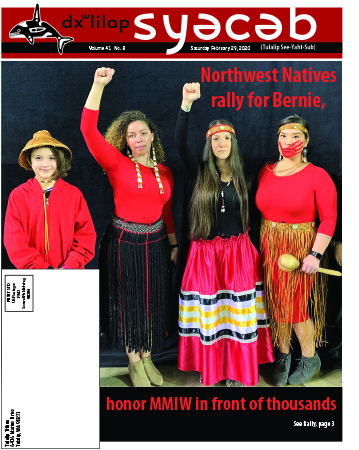Please use the following link to download the March 7, 2020 issue of the syəcəb
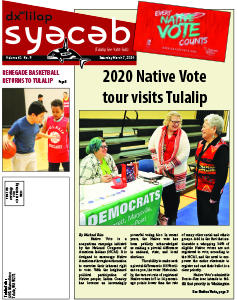
syəcəb
Please use the following link to download the March 7, 2020 issue of the syəcəb


With health officials now reporting 19 confirmed cases of coronavirus (COVID-19) in Snohomish County, the Tulalip Tribes is working to ensure the health and safety of its elders. Since elders are identified as some of the most vulnerable to COVID-19, extra precautions are being taken within the Tulalip community.
According to Rochelle Lubbers, Chief Administrative Officer of Tulalip Tribal Government Operations, as of Friday, March 6, the Katherine “Molly” Hatch Senior Center has temporarily closed its doors until tribal officials gain more information about the spreading virus. Bingo sessions, elder commission meetings and other gathering events have been canceled.
The Tribe considers those to be over 62 years-of-age an elder, and will be delivering soap, paper towels, hand sanitizers and information about the virus to all tribal member elders on the reservation. Following that, deliveries will be made to seniors over 55 years of age.
Elders are advised to stay in their houses to limit the exposure to a possible outbreak. If an elder is part of your household, buy supplies and help with errands if you can. Also be sure to call and check in on elders you know may need help. And most importantly, wash your hands regularly with an alcohol-based hand rub or with soap and water, and avoid touching your face.
If an elder has an illness, contact their doctor. If they are experiencing life-threatening symptoms call 911. For more information about COVID-19, contact the Snohomish County Health District hotline at 1-800-525-0127.
Elders are encouraged to tune in to Tulalip TV, Channel 3/503 (HD) for video updates from Tribal leaders about COVID-19. Tulalip TV can also be accessed at TulalipTV.com, the TulalipTV App, available from the Apple App Store/Google Play Store, and Roku and FireTV, Tulalip TV channels.
Please continue to check in with Tulalip News, at tulalipnews.com and Tulalip News Facebook and subscribe to emails for the most current information. You can also subscribe to the text alert line (text STORM to 30644), to receive updates and alerts.
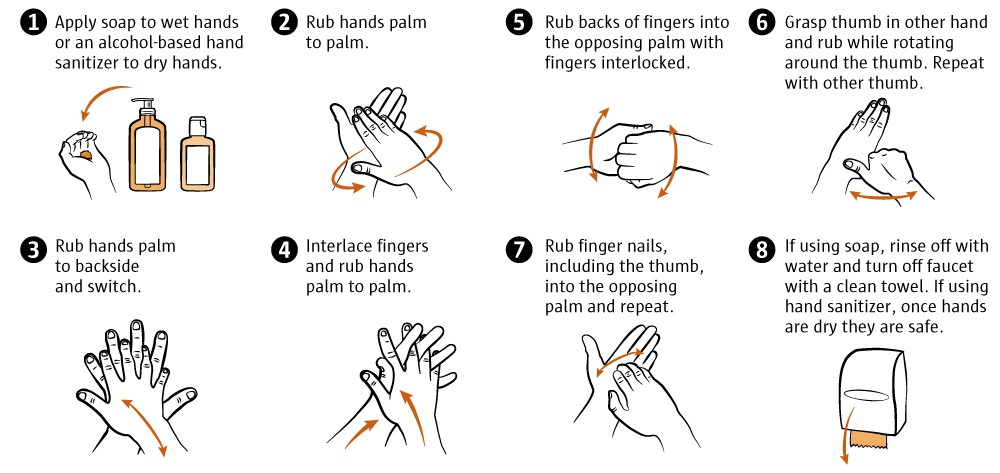
By Ashlynn Danielson, Tulalip Tribes Emergency Preparedness Manager
Earlier this week, we informed you that there were two patients exhibiting symptoms of COVID-19 who were transported from Tulalip to a hospital. As of this morning, we do not have confirmed positive cases of COVID-19.
Local medical systems do not have control over whether a patient is tested. When a patient meets the threshold and is tested, we do not have control over how quickly the results are processed. Typically it takes 72 hours for test results to come back to the Department of Health and longer if it was sent to the University of Washington lab for testing. As soon as results are received, the patient is notified immediately, then the patient’s primary care provider or the local Chief Medical Officer. Tulalip’s Chief Medical Officer is Dr. John Okemah.
When there is a positive test, the Department of Health mobilizes to track and notify the patient’s recent social contacts. The Department of Health monitors those likely to become infected and will request that they report any new symptoms and stay isolated in order to reduce the spread of COVID-19.
Close personal contact does not mean passing by someone at the grocery store or another common area. Personal contact means that you have been in close proximity for 10 minutes or more, with someone who was exhibiting active symptoms (cough, fever, shortness of breath).
For reliable information to some of the frequently asked questions about whether you are at risk for COVID-19, please visit the following websites.
What to do if you have confirmed or suspected coronavirus disease (COVID-19)
What to do if you were potentially exposed to someone with confirmed coronavirus disease (COVID-19)
Snohomish County Health District has set up a hotline (call 1-800-525-0127 then press #,) where you can speak with a medical professional and ask them any questions about COVID-19. We ask that you utilize this hotline, which is staffed with active medical reserve volunteers, from 8:00 a.m. to 6:00 p.m. daily. Tribal staff is also ready to take calls; however, because of staffing limitations, you may have a delayed response.
Our goal and plan are to be as transparent as possible. We will share new information as soon as possible. Please continue to check in with Tulalip News, subscribe to our emails for the most current information. You can also subscribe to our text alert line (text STORM to 30644), which is where we will send new information.
We will get through this together!
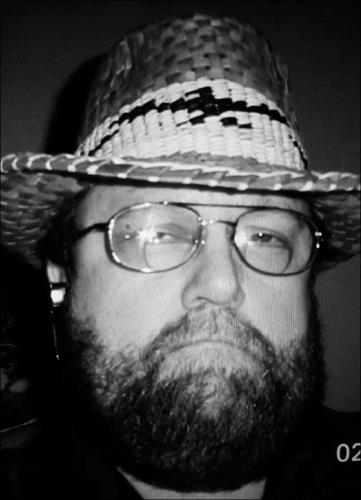
Clayton Willis Alexander Sept. 26, 1965 – March 3, 2020 The Lord blessed us with the life of Clayton Willis Alexander on September 26, 1965 born to Leora and Warren Alexander. The Lord took Clayton gently to heaven with him on March 3, 2020. His life may not have always been easy for Clayton, but nothing ever slowed him down. He lived life to the fullest. He loved all of his family and friends the same way he lived. And his family loved him the same way. Clayton loved hanging out with his family and being outdoors. His biggest hobby was spending time with his siblings. He enjoyed being outside cutting firewood and harvesting cedar bark. He never missed a family gathering. Now that he is with The Lord, he has joined his father, Warren Alexander, grandmother, Bernice Williams, grandfather, Walter “Sambo” Alexander, grandfather, Irven O’Harrah, grandmother, Corrine Steele; uncle, Jerry Alexander, aunt, Clara O’Harrah, aunt, Joanne Runyan, and Uncle Mike O’Harrah; cousins, Robert Cleary, Robin Perry, Dave Hunter; niece, Tara Taylor, great-nephew, Jaymen Taylor. He is survived by his mother and best friend, Leora Vandertie; sister, Tina (John) Crolley, brother, Warren Alexander (Warrine), Tammy Taylor (Lance), brother, Alan Alexander (Angela), brother, Jeff Nissell (Collen); special cousin, Justin Wahlsmith, aunts, Eleanor, Florence, uncle, Harry, aunt, Marlene (Painer), uncle, David, Lynne; daughter, Felicia, granddaughter, Rajalion (Raja) Holland whom he loved unconditionally, and numerous nieces, nephews, great-nieces, great-nephews, and many friends. Clayton was a proud member of the Tulalip Tribes and will be loved in memory to all who has shared his life. Visitation will be held on Saturday, March 7, 2020 at 9am at Schaefer-Shipman Funeral Home. Funeral services will be March 7, 2020 at 11am at the Tulalip Tribal Gym with burial to follow at Mission Beach Cemetery.

Coronavirus Q & A
Disease: COVID-19
Virus: SARS-CoV-2
With so much information about the novel coronavirus, it’s challenging to decide what is accurate and useful. The Tulalip Emergency Management Department, in collaboration with the Karen I. Fryberg Health Clinic and Snohomish County Public Health District, is committed to updating you about the virus regularly. We will plan to release our updates Mondays, Wednesdays, and Fridays, as well as when new information becomes available. For the latest accurate information, we encourage people to visit the following websites: CDC (Center for Disease Control) https://www.cdc.gov/coronavirus/2019-ncov/index.html, Snohomish County Health District https://www.snohd.org/, or the Department of Health https://www.doh.wa.gov/.
The following questions have come up in the last few days. Please let us know if you have additional questions you’d like us to answer—email questions and concerns to Ashlynn Danielson, Emergency Management, adanielson@tulaliptribes-nsn.gov.
Q: How do I know if it is COVID-19 or the flu?
A: COVID-19 and the flu have very similar symptoms. The COVID-19 includes cough and fever, particularly a fever that goes away and returns. Most people can overcome COVID-19 without medical intervention. If you suspect you have the COVID-19, please contact your regular medical provider via phone. If you are experiencing life-threatening symptoms, please call 911.
Q: What can I do to stay safe?
A: Wash hands frequently for 20 seconds with soap and water. Covering your mouth and nose with a tissue when coughing or sneezing, then throwing the tissue in the trash and washing your hands. If you develop symptoms, reduce the stress on the healthcare system and your risk of exposure by staying home and calling the doctor. Make it a habit to avoid touching your eyes, nose, and mouth. It is easy to transfer germs from surfaces to your body when you touch your face.
Q: Are there any COVID-19 cases at Tulalip?
A: There are likely possible positive cases that have been identified at Tulalip. A possible positive case is a patient who exhibits the signs and symptoms and is presumed to have the disease. These patients are then tested if they show moderate to severe symptoms. Testing capabilities are limited, and patients with mild symptoms are generally not checked to protect the supplies for the most critical patients. The Emergency Management Team, in collaboration with Community Health, local Tulalip Bay Fire District 15 and Marysville Fire Department, and Tulalip Police Department, have a plan in place to track presumptive positive cases to keep our public informed and reduce the spread of the disease. Presumptive positive is a term which means that while local testing has produced a positive result for COVID-19, the sample is still awaiting confirmation from the CDC.
Q: Does handwashing work better than hand sanitizer?
A: Soap and water are better than hand sanitizers at removing specific kinds of germs, especially on dirty hands. However, for people who have mobility issues or lack of access to clean running water, hand sanitizer is useful in a pinch.
Q: How do I decide whether to stay home from work, go to a clinic, or go to the hospital?
A: If you have a fever and cough, as well as any flu-like symptoms, please call your regular health care provider. They will do a phone triage, or a series of questions to determine if it is likely that you have contracted COVID-19. Based on your doctor’s recommendation, you should self-isolate and limit your exposure to others, visit a healthcare facility, or, if you are experiencing life-threatening symptoms including shortness of breath or chest pain, call 911.
Q: I need to be seen, but my doctor told me to stay home. Why are they treating me like this?
A: Your doctor may ask you to self-isolate, or stay home and limit your exposure to others, to protect you and the people around you. In many cases, patients are putting themselves at risk for contracting the disease by going to a medical facility when they do not need to. In other cases, you may risk infecting others. Lastly, in situations like this, health care facilities can become overwhelmed with minor illnesses, which reduces their ability to take care of those patients who do experience life-threatening symptoms from the disease.
Q: What is Tribal Government doing?
A: Tribal Government administration has briefed managers about the situation and is encouraging staff to be diligent about sanitizing high-touch areas, including keyboards, doorknobs, and handrails. Tribal government is encouraging staff who have COVID-19 symptoms to stay home from work for at least seven days and/or 72 hours after symptoms resolve, whichever is longer. The Pharmacy will be holding a seasonal influenza clinic at the Administration building to provide staff with a seasonal flu vaccine. This is a protective measure. This vaccine does not protect against COVID-19. When a person contracts seasonal influenza, it can raise their risk of contracting COVID-19, so flu vaccines are being recommended. Some policies are being temporarily relaxed to allow employees to take sensible precautions. For example, supervisors may waive the requirement for a doctor’s note before returning to work. We are doing this to reduce the non-emergent workload for medical facilities.
Q: What are our casinos doing?
A: Leadership is putting strategies in place to both sanitize the facilities more thoroughly and protect staff and clients by encouraging team members who exhibit symptoms of COVID-19 to stay home from work based on current medical recommendations. Leadership will be flexible about employee leave to take care of the health of our community.
Q: Will our health clinic close if it gets worse?
A: Staff at the Karen I. Fryberg Health Clinic have been involved in planning and are putting precautions in place to make sure that staff stays healthy, and the clinic remains operational. As you enter the clinic, a staff member will ask you to sanitize your hands. If you show any signs of a cough or upper respiratory infection, you may be provided a mask and asked to wear it to contain your cough. Another new procedure is phone triaging. This means that patients who exhibit symptoms of COVID-19 will be asked a series of questions to determine if it is likely they have contracted the disease. Patients with mild symptoms will be advised to isolate, to protect them from contracting the illness if they do not have it, and to prevent them from spreading the illness if they are ill with COVID-19. Patients with moderate symptoms may be asked to come in and call when they arrive. At that point staff will **
Q: Why do emergency personnel need masks if they don’t work?
A: Masks will not stop you from contracting COVID-19 since they do not cover your eyes and do not filter out viruses. However, if you are already sick, a mask can limit the distance that droplets travel when you cough or sneeze. Medical professionals ask patients exhibiting symptoms to wear a mask.
First responders and emergency personnel will wear full personal protective equipment if seeing a client suspected of or infected with COVID-19. They wear both masks and goggles to protect the eyes, nose, and mouth. They may also wear disposable gowns and foot covers that can be disposed of in a medically safe manner to reduce transmission of COVID-19.
Q: COVID-19 isn’t the flu, why should I get a flu shot?
A: Although the seasonal flu shot will not protect you from COVID-19, it can reduce your risk of getting the flu. Coming down with any illness can increase your risk of catching a second illness, which is why we recommend people get a seasonal flu vaccine if they have not already.
Q: What is the incubation period?
A: This virus is new; we are learning more about it every day. The current medical recommendation is that if you show symptoms to isolate yourself. Encourage family members to stay six feet away to reduce the transmission of the disease. Do not return to work or school for seven days or 72 hours after all symptoms have resolved, whichever is longer.
Q: How can I talk to my kids about COVID-19 when I am scared that it won’t be all right?
A: Viruses have been around for all of human history. We can work to limit our exposure and contain it. COVID-19 doesn’t appear to have the high fatality rates of viruses like Ebola or Hemorrhagic virus. Most healthy people have mild symptoms, and their immune system deals with the virus. We can take care of ourselves and the people around us, especially elders and those with compromised immune systems, by letting people know if we are sick and staying away from others who are sick. We care about one another, and even though this is a scary time, we’ll get through it together.
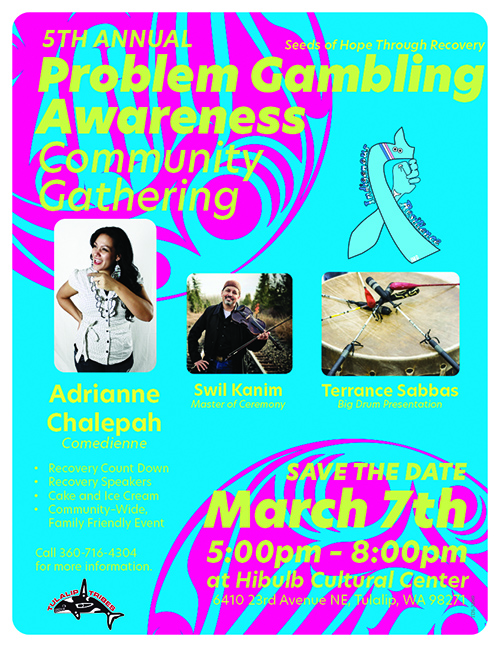
By Kalvin Valdillez, Tulalip News
“It’s so widespread, but the societal norm is that it’s not accepted as a disease,” said Tulalip Problem Gambling Counselor, Robin Johnson. “A lot of people who come and see us will say that they feel like they don’t have a real problem, so this is raising awareness about the fact that problem gambling is a disease and also of the detriments that it causes in real life. There is help. You are not alone.”
The Tulalip Tribes Family Services Problem Gambling Program invites you and yours to a special soiree on the evening of March 7th. A popular community event, and highly anticipated within the recovery circle, the annual Problem Gambling Awareness Gathering promotes healing, education and awareness about an addiction that nationally affects approximately six million individuals and their families each year, according to the National Council on Problem Gambling.
“In most Indigenous communities there’s higher risk of acquiring a gambling disorder,” explained Problem Gambling Coordinator, Sarah Sense-Wilson. “That’s because of co-occurring disorders, mental health, addiction, proximity to gambling establishments and trauma issues. Those things all factor into why Indigenous populations tend to have vulnerability for a gambling disorder.”
For half a decade, the Tulalip Problem Gambling program has actively taken part in a countrywide initiative, Problem Gambling Awareness Month, by hosting local events and providing support to those in need each March. The campaign originally began over fifteen years ago in response to the amount of sports betting surrounding the NCAA March Madness college basketball tournament. Since Tulalip’s involvement in the awareness month, recovering gambling addicts who live at Tulalip, or in nearby cities, have found a sense of community and people who they can relate to and confide in during their journey to recovery.
“The theme for this year’s Problem Gambling Awareness month is ‘Seeds of Hope Through Recovery.’ That comes from the problem gambling recovery community, they’re the ones who conceptualized the theme,” Sarah said. “It impacts everybody in the community at some level, especially in our tribal communities, because we’re so small and tight knit. When I first started here, there was a real void in any collective effort to promote health and wellness around this issue of problem gambling, throughout the region not just at Tulalip. And really, there are no collective efforts or campaigns in Indian country to spotlight this as illness or disease.”
As a people, Native Americans are at the highest risk of developing a gambling habit. A 2019 study conducted by the National Institute on Alcohol and Related Conditions showed that 2.3% of the entire Indigenous population are currently battling the gambling addiction, one of the highest percentages in the nation. Recognizing that this is an issue affecting our tribal people, several Northwest tribes are addressing problem gambling by developing programs to help their people from within the community. Many of those nations, whose programs are still in the infancy stage, often send representatives to participate in events at Tulalip to get a better understanding of how the tribal people are interacting with the program.
Sarah explains, “Our program is a national model program because of the comprehensive services we provide and the expansive work that we’ve created here developing not just treatment, but also prevention, education, community outreach, all of those aspects. Usually, you don’t see that continuum of support services in any other addiction field program. This is also a great opportunity for cross-cultural understanding because we serve non-Natives too. In fact, our services are free and we work with everybody.”
The 5th Annual Problem Gambling Awareness Community Gathering takes place Saturday March 7, from 5:00 p.m. to 8:00 p.m. at the Hibulb Cultural Center. Medicine will be offered all evening in the form of laughter provided by comedienne Adrianne Chalepah, traditional drum circle led by Terrance Sabbas and family, personal testimonials from recovering gambling addicts, as well as soothing tunes from Native violinist, Swil Kanim, who also doubles as the event’s Master of Ceremony.
“We’re trying to keep the same formula, bringing healing through comedic relief and raising awareness, trying to destigmatize the illness so that people are more open to receiving help or seeking services. We want people to understand that this is a disease, a disorder just like diabetes, high blood pressure, there’s no shame in it. We just want to see people get well and live healthy. It really does take a community to make it happen and that’s our goal. These events are not just about calling attention and centering on those in recovery; it’s also about reaching those who are still suffering.”
For more information, please contact the Problem Gambling program at (360) 716-4304.
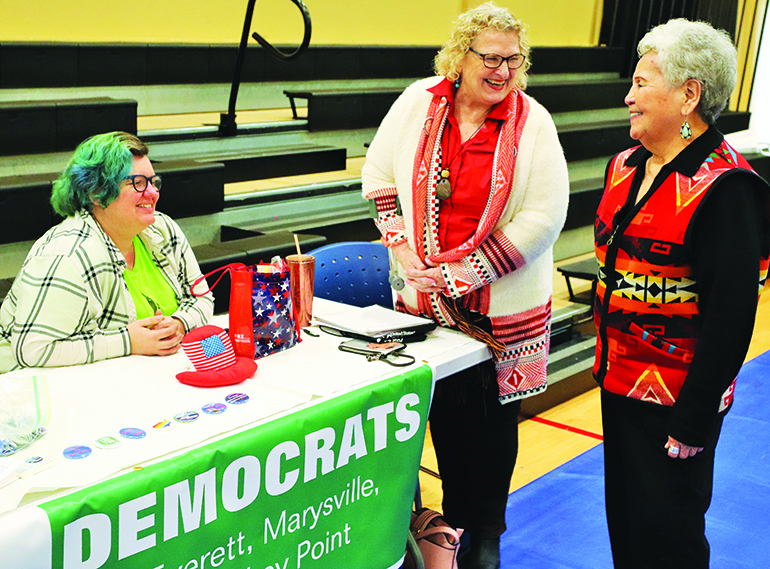
By Micheal Rios, Tulalip News
Native Vote is a nonpartisan campaign initiated by the National Congress of American Indians (NCAI). It is designed to encourage Native Americans throughout the nation to exercise their inherent right to vote. With the heightened political participation of Native people, Indian Country has become an increasingly powerful voting bloc. In recent years, the Native vote has been publicly acknowledged as making a pivotal difference in national, state, and local elections.
The ability to make such a pivotal difference is 100% reliant on you, the voter. Historically, the turnout rate of registered Native voters is 5 to 14 percentage points lower than the rate of many other racial and ethnic groups. Add in the fact that nationwide a whopping 34% of eligible Native voters are not registered to vote, according to the NCAI, and the need to empower the entire electorate to register and cast their ballot is a clear priority.
Native Vote’s admirable Rez-to-Rez tour intends to fulfill that priority in Washington State by going directly to Native voters on their reservations, speaking truth to power on issues that impact our people, while encouraging each tribal citizen to vote. The Rez-to-Rez tour visited Tulalip on Tuesday, March 3.
“I’m honored to be here with you all on Tulalip land,” said Larry Cordier (Lakota), coordinated campaign tribal organizer. “It is critical that we get together, register to vote, and let our voice be heard by casting our ballot. Your vote is guaranteed to you by the U.S. Constitution. As treaty tribes, we have joined the United States in citizenship. Our men and women have defended this country. No one has to set that table for us. We did that with our veterans.
“The chiefs negotiated those treaties and it’s our responsibility to make sure those Treaty Rights endure,” continued Larry. “In all my travels I’ve heard so many people say, ‘Why should I vote? My vote doesn’t count.’ But if all those people got out and registered, and cast their ballot, we would have this country exactly where it needs to be. We need everyone because everyone counts. So let’s mobilize and make them feel our united power.”
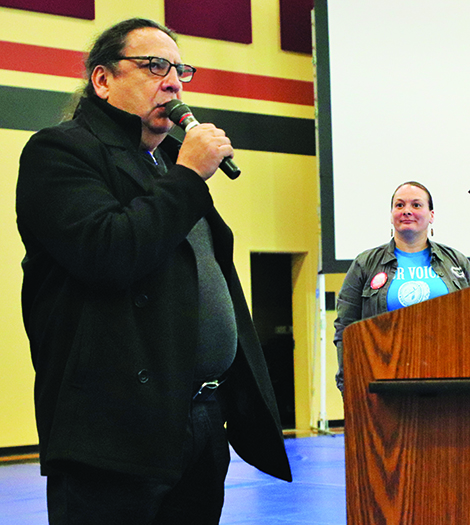
During the two-hour visit, engaged citizens were welcome to ask questions about candidates, register if they weren’t already, shown how to update their mailing address to insure arrival of voting documents, speak with 2020 Census representatives, and, if they were ready, cast their Washington State primary ballot.
“I saw the advertisement for this event in the Tulalip newsletter and was interested in finding out more about the presidential candidates,” shared tribal elder Joyce Alexander (Haida). “I haven’t decided who I will be voting for yet, but leaning between Bernie Sanders and Joe Biden.
“As a Native American citizen, I’m always curious about how any politician or political candidate feels about Native Americans. [Their platform] affects us and our issues should matter to them.”
According to the U.S. Census, Native Americans have one of the youngest populations of any racial/ethnic group in the United States, with those under the age of 25 making up about 40% of the total Native population. Every four years, about half a million Native young people turn 18-years-old and become eligible to vote. This provides an opportunity to engage almost one in ten Native people as new voters.
In order to maximize the Native vote, it is critical that Native citizens become educated in the political process in order to actively participate in tribal, local, state, and national elections. It’s not only the U.S. President and Congress, but state governors and county and local elected officials who make important policy decisions that affect the everyday lives of Native peoples. Increasing the Native vote and in turn our electorate’s participation in non-tribal elections will lead to better responsiveness to the needs of tribal communities across the nation.
“One of the beautiful things about voting is it is open and accessible to everyone. And every vote matters,” explained Theresa Sheldon (Tulalip), Native American political director for the Democratic National Committee (DNC). “Please know that it’s not too late for people to register to vote. There is a great online resource iWillVote.com
“Anyone can visit that site to register, check if you are registered, and/or update your mailing address. It’s so important to know that if we want to take back the white house, then we have to show up and vote. Please talk to your friends, your family and encourage them to get their ballot in. Sooner is better. Don’t wait until the last minute,” encouraged Theresa.
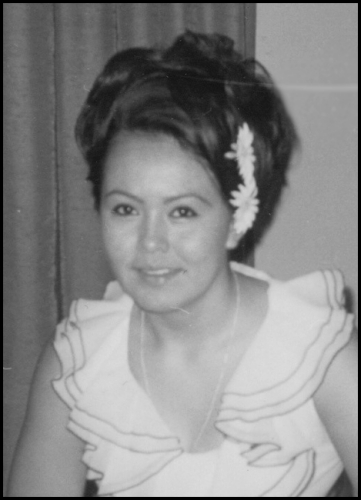
Beverly J. Echevarria {1948-2020} Beverley Jean Echevarria died on February 28, 2020. Jeannie was born to parents, Norma Genevieve (Shelton) Rivera and John Vargas Rivera in Tacoma, WA. She started out as a hairdresser. She worked most of her life as an accountant in the financial department in several companies around Seattle, but most recently at Tulalip Tribes Quil Ceda Village for over a decade. Jeannie worked very hard her whole life for the love of her family. She attended and earned her degree at Everett Community College and the University of Washington. She met her husband, Carlos Echevarria in 1968, they then moved to Puerto Rico, Alaska, and the remainder her life in the Magnolia area of Seattle for 40 years. Carlos and Jeannie would have celebrated 52 years married this year. Jeannie was the big sister and mother to her siblings, brother, John Jr. and Carlos and sister, Lydia. She had three children, Carlos Jr, Jesus and Juan Echevarria. They were the true loves of her life. Her joy was sprung up by her grandchildren, having special relationships with every one: Mekalani Lynn, Jesus Antonio, Alexzes Jeannie, Raihan Shibly, Gia Marie and Cameron, as well as one new bundle of joy on the way. She loved shopping for them and spoiling them. She loved sewing, and traveling and studying. A Celebration of her life will be held on Thursday, March 5, 2020 at 6:00 p.m. at Greg Williams Court, 6700 Totem Beach Road and Friday, March 6, 2020 at 10:00 a.m. at Greg Williams Court. Burial will follow at Mission Beach Cemetery. She was preceded in death by her son, Jesus Antonio; her parents, Norma and John; her brothers, John and Carlos; and her sister, Lydia. She is survived by her husband, Carlos Echevarria of Seattle; Carlos Echevarria and Katie Moore of Tulalip, WA; Juan and Nazmi Echevarria of Kirkland, WA; daughter, Heather Gobin of Tulalip, WA; and her grandchildren: Mekalani, Jesus, Alexzes, Raihan, Gia and Cameron.
Please use the following link to download the February 29, 2020 issue of the syəcəb
